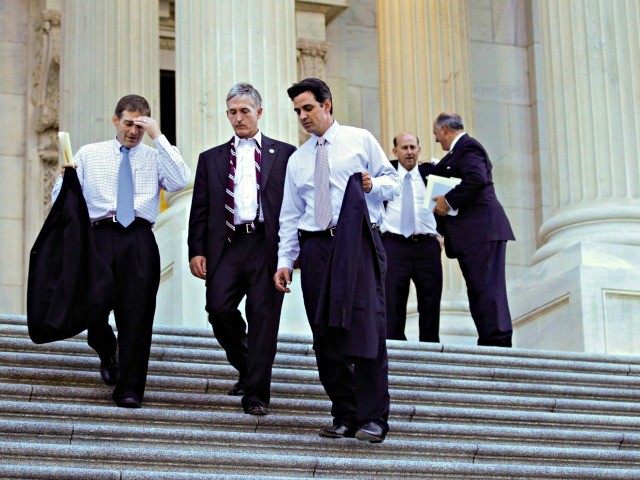Traditionally, the Republican Study Committee (RSC) has been the voice of the more conservative members of the House GOP. But with its membership swelling, RSC’s conservative members are increasingly frustrated by leadership they view as more establishment-aligned. So a core group of House conservatives is said to be set to form a new group in what is being characterized as a “mass exodus.”
“We’ve had some discussions, and certainly there are several members that are concerned about the direction of the RSC and want to have an organization that reflects the diverse viewpoints of Republicans at home,” said Rep. Justin Amash, who is among those expected to leave.
National Journal reports: “other founders are … Ron DeSantis, John Fleming, Scott Garrett, Raul Labrador, Mark Meadows, and Matt Salmon. Most but not all of those members are expected to renounce their RSC memberships, along with other members who will join the group.
The members have been talking for weeks, and they met Monday night to formalize their plans to institutionalize a competing, invitation-only organization that they see as a real conservative caucus that can push Speaker John Boehner rightward.
Once a bastion for the conservative movement, the RSC has strayed too far from its original mission and been co-opted by the same party leaders it is meant to exert pressure upon, the members believe.
A former RSC Chairman, Jim Jordan, is said to be heading the new effort, at least for the time being. It would also have a dues structure, which would allow it to hire its own staff.
As NJ reports also reports, “…the members will meet Tuesday evening with Sen. Ted Cruz to discuss their plans and other matters over pizza, though Cruz himself has not been involved in the formation of the new group. Cruz’s chief of staff, Paul Teller, was fired from his role as RSC executive director in 2013 after provoking the ire of party leaders and some members of the group.” The report continues:
The new group is a direct rebuke of RSC Chairman Bill Flores, who after he won election over Mulvaney told the press that he does not believe the RSC’s core mission should be to put pressure on leadership. But the tensions go further back. Before Flores, Rep. Steve Scalise—now the majority whip—won election as the group’s chairman over Rep. Tom Graves, whom the now-disaffected members saw as the more conservative candidate. Scalise also fired Teller, angering some members.
The RSC appears to be downplaying the split for now. “Flores said Monday that he is not concerned. He said the RSC is still the only group that can not only outline policy but also influence votes on the House floor.”
However, with grassroots increasingly dissatisfied with what many view as a GOP either too weak, or unwilling to take on the White House, or hold the line on issues including illegal immigration, this latest split is just one more in a growing number of signs that the GOP is far from united as the new Congress convenes, with a critical presidential election not all that far off in the distance. According to the Journal:
Apart from dissatisfaction with the outcome of the races for RSC chairman, members believe the group has become too unwieldy because of its swollen size. Though it started in the 1990s with just a handful of members, the RSC swelled to more than 170 members in the 113th Congress.
On its website, the RSC is described as a place where “a minority of committed men and women without years of seniority or formal leadership positions can affect change.” But with more than two-thirds of the GOP conference in the RSC — and many of the members not playing an active role — lawmakers who do not regularly attend the weekly group meetings hold sway over its elections and general direction.

COMMENTS
Please let us know if you're having issues with commenting.